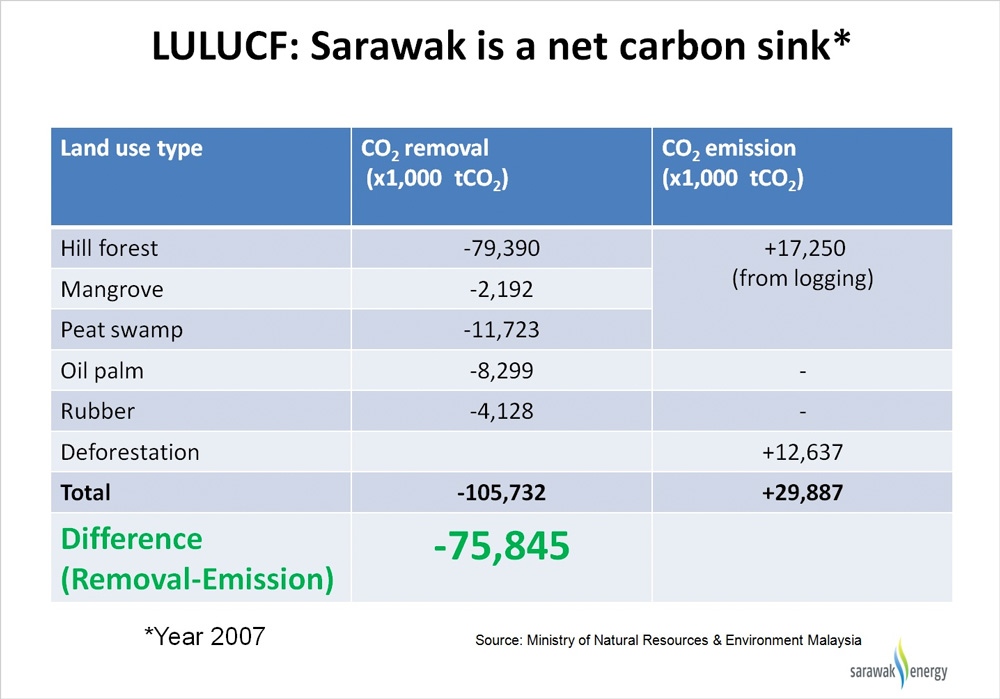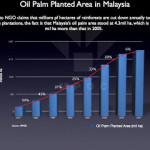No Deforestation – An Ethically Irresponsible and Flawed Demand by ENGOs
The ENGOs have recently pushed for a no deforestation policy for oil palm producers. This unilateral move was made possible by getting big food companies to force palm oil suppliers to agree to a manifesto denouncing that palm oil from forest or peat areas will not be accepted by the European food companies. This approach, crafted by ENGOs, ignores the agreement made through the RSPO. Their no deforestation policy remains an ideology that fails to consider its scientific impact on the development of underdeveloped countries with plentiful access to land banks. The ENGOs fail to consider the fact that all areas of a tropical state, such as Sarawak, will be covered with forest if left undisturbed. Hence, there is no permanent grassland or low carbon stock land as forest will be rapidly re-established over time.
Normally, in a tropical developing country such as Malaysia, forest land earmarked for agricultural development has to be gazetted for conversion to agricultural use to plant crops such as oil palm and rubber. The no deforestation ideology is inappropriate for a developing country that is still in the process of developing as it will halt agricultural and economic development.
The unilateral demand for zero deforestation policy is imposed without any scientific basis. There is no international or UN framework that supports a no deforestation policy. For states or countries which are still undeveloped, imposition of a no deforestation policy means denying them of their sovereign right to develop their land for agricultural purposes. Without agriculture, such a state or country will be condemned to stay in poverty perpetually. Ultimately, it also hinders efforts needed to expand food production to meet global demand.
This is clearly a discriminatory treatment as the no deforestation policy is not applied to other competing crops. Such demands primarily come from western manufactures and retailers. For e.g. Unilever which promotes the no deforestation policy is only signing the manifesto with palm oil companies and not with other oilseed producing companies which may be involved with larger scale deforestation as these oilseeds are more land intensive. This collusion with ENGOs implies that much larger deforestation can take place via the planting of other crops or even cattle rearing in other areas of the world, and these products will continue to be used by food companies in Europe.
Discrimination of palm oil products though a bizarre policy of no deforestation will be highly counter -productive. Many innocent palm oil farmers will be victimized as this escalates costs, and blocks market access for their palm oil products. Meanwhile, deforestation due to the production of other food commodities will escalate as they are not subjected to any ‘no deforestation ‘policy for market access.
There will be many unintended consequences. The State of Sarawak in Malaysia has protested against the imposition of the no deforestation policy because it needs agricultural development to sustain future growth and to support poverty eradication efforts . Sarawak plans to set aside a portion of its land for agriculture development . This is a sovereign right, because the states assets are based on its land bank similar to Europe and the US which have developed a part of their land banks into agricultural industries in the past.
Sarawak is covered with 82 % forest and only has 15% under agriculture. This is common for an under-developed state compared to a developed country such as the UK which has only 12 % forest cover and 71 % of its land area under agriculture as shown in the chart below. Yet, Sarawak has been at the receiving end of endless NGO campaigns which threaten to deny market access for its agricultural products into the EU. If sustainability or reducing CO2 emissions is the ultimate objective, the NGOs should focus on the developed countries which have over deforested and over developed their land for agricultural use. Even if it is argued that those land areas were deforested by their un-educated fore-fathers, reforestation can be carried out and achieved within a couple of decades. Reforestation will then help remove CO2 from the atmosphere because of past deforestation of the same land.
Sarawak has been a net CO2 sink state even until the present time. In 2012, Sarawak removed 106 million tones of CO2 and emitted 30 million tones of CO2, giving it a net CO2 sink status of 76 million tones per year. Considering that Sarawak has been a CO2 remover by larger amounts in the past, it has essentially been cleaning up the emission of net emitter countries which have industrialized their economies and developed their agriculture during the past 2 centuries. Now that the time has come for Sarawak to take its turn to develop its agriculture, it is prevented from doing so by the unilateral no deforestation policy imposed by ENGOs, associated companies and politicians by threatening market access of palm oil into their markets.
It can be clearly established that the no deforestation policy will victimize developing countries which are still undergoing development. More importantly, states such as Sarawak are net removers of CO2 and have been playing this important role since historical times. Denying Sarawak a chance to develop its economy via increasing the % use of its land bank for agriculture is morally unethical, socially irresponsible and scientifically unjustified. At least, Sarawak should be encouraged to develop its agriculture industries up to a point where it remains carbon neutral, ( not yet a CO2 net emitter). If Sarawak chooses to plant oil palm as its preferred agricultural crop, it will continue to be a net carbon remover even if it reaches the 50% forest conservation limit stipulated in the country’s commitment to forest conservation.
The global driver of deforestation is cattle and livestock farming which occupies 3.5 billion ha of agricultural land or 25% of world land mass, compared with only 15 million ha or 0.1% occupied by oil palm. As the demand for cattle and livestock products will double by 2050 as predicted by the FAO, the deforestation impact of cattle and livestock farming will be devastating assuming land occupied by this sector will double to 50% of the global land mass. Oil palm demand and production may also double or triple, but it will occupy no more than 0.2 or 0.3 % of the world land area.
Blindly following the ENGOs no deforestation ideology can lead to a catastrophic effect of maximizing deforestation by land intensive industries such as cattle and soyabean farming, and hamper the development of forest friendly and high yielding oil producing crops such as palm oil. But these unintended consequences are not really accidental. ENGOs are funded by the EU countries to stop palm oil expansion so as not to participate in thier biodiesel sector and compete with local oil seed producers supplying the EU market. A pertinent question that remains unanswered is why the most devastating deforestation agents such as the cattle and livestock industries are not the focus of the ENGOs no deforestation campaign. Could it be due to their vested interest not to jeopardize their own industries however damaging they may be.
Governments and palm oil producing countries should be shaping policies on palm oil, not Western environmental NGOs who have no interest in ensuring environmental policies complement country policies. It is the sovereign right of countries to develop their land in order to remove poverty which then provides economic and political stability for a country and its people.












Leave a Reply